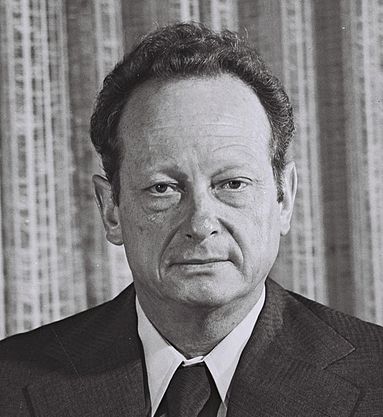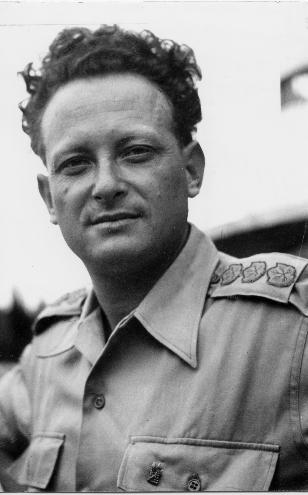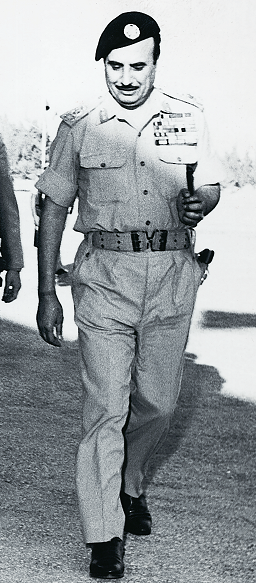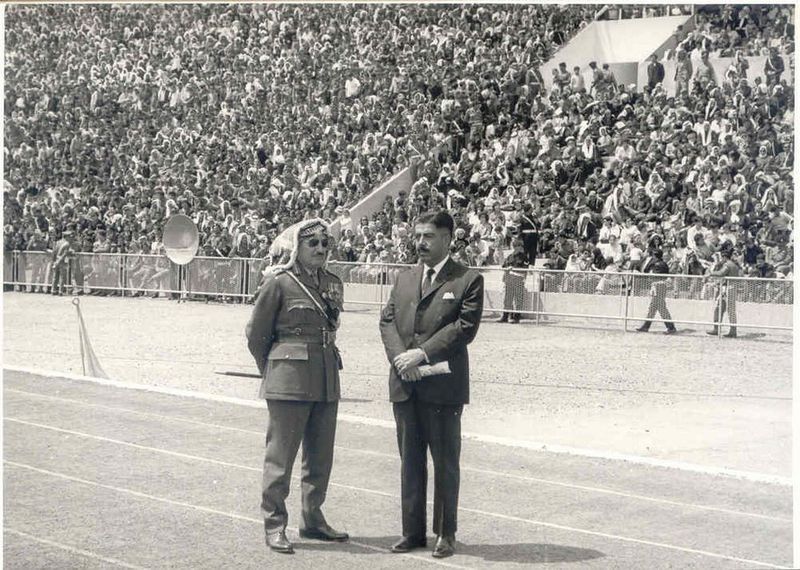<Back to Index>
- General of the IDF Yigal Allon, 1918
- Field Marshal of the Jordanian Army Habis al-Majali, 1914
PAGE SPONSOR


Yigal Allon (Hebrew: יגאל אלון, 10 October 1918 – 29 February 1980) was an Israeli politician, a commander of the Palmach, and a general in the IDF. He served as one of the leaders of Ahdut HaAvoda party and the Israeli Labor party, and acting Prime Minister of Israel, and was a member of the Knesset and government minister from the 10th through the 17th Knessets.
Allon was born in Kfar Tavor in the Ottoman Empire. In 1937 he graduated from Kadoorie Agricultural High School, and joined kibbutz Ginosar.
He died in Afula on 29 February 1980 and was buried on the shore of Lake Kinneret (the Sea of Galilee) in the cemetery of Kibbutz Ginosar.
Allon commanded a field unit of the Haganah and then a mobile patrol in northern Palestine during the Arab riots of 1936 – 39. During this period he participated in several operations of the Special Night Squads (SNS), under the command of Orde Charles Wingate and H.E.N. Bredin. In 1941 he became one of the founding members of the Palmach. That same year he took part in the British invasion of Lebanon and Syria. In 1943 he became the Deputy Commander of the organization, and served in this post until 1945, when he became Commander in Chief.
As a Palmach commander, Yigal Allon approved the 18 December 1947 operation against al Khisas, near the Lebanese border in which houses were blown up and a dozen civilians were killed.
On 11 June 1948, at the climax of Ben Gurion's confrontation with the Irgun over the distribution of weapons from the Altalena, Allon commanded the troops ordered to shell the vessel.
During the 1948 Arab - Israeli War, Allon led several of the major operations on all three fronts, including Yiftach in the Galilee, Danny in the Center, Yoav, and Horev in the Negev. His last major military roles as commander were in October and December 1948: Operation Yoav towards the Hebron Hills and Operation Horev along the Southern Egyptian Front.
As Operational Commander of the Southern Command he was responsible for security along the borders with Egypt and parts of Jordan. On 4 June 1949 he ordered that an eight kilometer wide zone along the border would be military area in which "all strangers found in [them] will be shot without interrogation."
On 25 October 1949, while he was out of the country, he was replaced as OC Southern Command by Moshe Dayan. Most of his Staff Officers resigned in protest. He retired from active service in 1950.
After ending his military career, Allon embarked on a political career. He became a prominent leader in Ahdut HaAvoda, and was first elected to the Knesset in 1955, where he served until his death. He was a member of the Economic Affairs Committee, Constitution, Law and Justice Committee, Education and Culture Committee, Joint Committee on the Motion for the Agenda Regarding Sports in Israel, and the Foreign Affairs and Defense Committee.
Allon served as the Minister of Labor from 1961 – 67. In this role he worked to improve the state employment service, extend the road network, and fought to get legislation on labor relations passed. From 1967 – 69 he served as the Deputy Prime Minister and Minister of Immigrant Absorption. Allon served briefly as interim Prime Minister following the death of Levi Eshkol on 26 February 1969. He held office until 17 March 1969, when Golda Meir took over after being appointed leader of the Labor Party. He became the Deputy Prime Minister and Minister of Education and Culture in Meir's government, and served in that post until 1974. During the September 1970 crisis in Jordan he advocated supporting King Hussein in his conflict with the PLO. In 1974 he was a part of the delegation to the Separation of Forces Agreement. He became the Minister of Foreign Affairs in 1974, and held this post until 1977. At the time of his sudden death in 1980, he was a candidate for the leadership of the Alignment, challenging the incumbent party head Shimon Peres.
Allon was the architect of the Allon Plan, a proposal to end the Israeli occupation of the West Bank
with a negotiated partition of territories. A major road in the West
Bank, leading north - eastwards from Jerusalem, is named after him.
In 2005, he was voted the 65th greatest Israeli of all time, in a poll by the Israeli news website Ynet to determine whom the general public considered the 200 Greatest Israelis.


Field Marshal Habis al-Majali (Arabic: حابس المجالي; 1914 – April 22, 2001) was a noted Jordanian soldier from the southern city of Al Karak. Habis served as Chief of staff, Jordanian Armed Forces 1958 - 1975, Minister of Defense 1967 - 1968, and 20-year member of the Jordanian Senate for 5 terms (1967, 1984, 1989, 1993 and 1997)
Habis Pasha is the son of Sheik Refefan
Habis joined the Arab Legion in 1932, and soon impressed Glubb Pasha. Despite acquiring modern skills, he never lost his Bedouin elan. King Hussein's biographer, James Lunt, dubbed him the grand seigneur of Karak and beau sabreur of the army.
Habis Pasha was the only Arab commander to win military victories against Israelis, Palestinians and Syrians alike. His baptism of fire came during the first Arab - Israeli war, when he successfully defended the town of Latrun, 17 miles west of Jerusalem, against the Israelis.
The Jewish state had declared independence on May 14, 1948. The next day, the armies of five Arab nations invaded, among them the Bedouin of Transjordan's crack Arab Legion, under the supreme command of Glubb Pasha. They immediately secured the West Bank, then rushed to fill the vacuum created by British troops leaving Jerusalem.
Meanwhile, the Jewish forces were desperate to keep open their lines of communication with the 85,000 besieged Jews of Jerusalem at Latrun, the epicenter of the only route linking Tel Aviv with Jerusalem.
Lieutenant Colonel Majali, the first Arab to head a legion regiment, occupied a strategic hill straddling the nearby Bab al Wad (Gate to the Valley). His spies fanned the countryside, while he held a deserted British police fort, built near a Trappist monastery in 1936.
When the Haganah attacked on May 25, Majali's Fourth Regiment was ready. Their camouflaged mortars, machine guns and cannon caught the mainly immigrant recruits on open ground, and cut them to shreds over 15 hours. two months before his death, Habis claimed that he had caught a young Lieutenant Ariel Sharon in the battle. The new Israeli prime minister denied the claim, but Habis was adamant. "Sharon is like a grizzly bear," he grumbled. "I captured him for 9 days, I healed his wounds and released him due to his insignificance.", few fellow high ranking Jordanian army officers testified in favor of this account, no others.
On June 9, an Israeli Palmach strike force attempted a second raid on Latrun. This, too, faltered for want of reinforcements, only yards from Majali's command post. In mid July, he repulsed a final assault - and returned to Amman a thrice conquering hero. He restored a modicum of pride to Arabs, for whom 1948 spelt nakba (disaster).
Nonetheless, it was a Pyrrhic victory. Despite their losses at Latrun, the Haganah pinned down Jordanian troops who might have been fighting in Jerusalem. The Israelis also managed to build a makeshift bypass round Latrun and siphoned through vital arms, water and supplies.
Majali's brigade commander, Colonel Ashton, forbade him from shelling their bulldozers. Ultimately, Transjordanian troops, assisted by local Arabs, did capture the Old City and East Jerusalem and demolished the Jewish Quarter.
It was in the Old City, three years later, that Habis Al-Majali
experienced tragedy at first-hand. For two years, he had been the
private escort to King Abdullah of Jordan. Then, on July 20, 1951, as he was ushering the king to prayers at the Al Aqsa mosque, Abdullah was shot dead by an anti - Hashemite Palestinian.
Certainly, King Hussein found him indispensable. He ruthlessly tracked down the Hashemite ruler's Nasserite enemies during the uprising of 1958. In 1960, he restored order after pro - Syrian agents had murdered his cousin, the Jordanian prime minister, Hazza' al-Majali. Forced to relinquish overall command to Cairo on the eve of the Six Day War in June 1967, and bemused by conflicting orders, he lost the West Bank to Israel. He resigned, but served as defense minister for another year.
There were more setbacks in store. Majali backed Prince Na'if as successor to the Jordanian throne, though, in the event, his elder brother, Prince Talal, won the crown. Matters only improved after King Hussein replaced his father, Talal, in 1953. Three years later, Glubb was dismissed, and, in 1957, Majali became chief - of - staff of the Jordanian armed forces, a post he held until June 1967.
Majali's return to active duty was sudden and dramatic. Jordanian based Palestinian fedayeen (guerrillas) were growing more autonomous and audacious. After terrorists destroyed four international aircraft near army headquarters at al-Zarqa, in September 1970, Hussein declared martial law, re-appointed Majali as commander - in - chief, and ordered him to crush the revolt.
Habis did so with relish. Over 10 days, his troops routed the
fedayeen; some 3,500 fighters died on both sides. He also repulsed a
pro-PLO Syrian invasion - destroying half the enemy's armor in the
process, and inadvertently setting off the coup that brought President al-Assad to power in Damascus. In July 1971, the remaining PLO units in Jordan were expelled to Lebanon.
Despite these victories, the old warhorse found it hard to forgive old enemies; in 1994, for instance, he boycotted the official ceremonies marking Jordan's peace deal with Israel. Seen as atavistic by many, he represented a somehow nobler, if not gentler, past. He is survived by seven children and 27 grandchildren; his wife Bazaa' predeceased him.
A famous Dehia (traditional bedouin folk song that rhymes the first part of a verse to the second both are usually made of 8 syllables) which is sung in most traditional occasions, especially in his hometown Kerak features Habis as the hero of it
Saria Gayidha Habis Tehesh Al-Akhdhar Wa Al Yabis
Sa-Ri-ya Ga-yid-ha Ha-bis Te-hesh Al-Akh-dar waal-ya-bis
roughly translated:
A platoon led by Habis eradicates Green and Hard
Meaning: An army led by Habis, will overcome all obstacles regardless.
Majalis have long dominated Karak, an Arabian province that joined the Emirate of Transjordan in 1646. They had integrated comfortably into Bedouin society. Earlier, and more crucially, they had welcomed Hashemite rule in Jordan.
Thus, as a reward for unswerving loyalty, Majalis have been prime ministers, police chiefs and speakers of the Jordanian national assembly; Habis himself served some 20 years as a senator, including a period on the foreign affairs committee. Nonetheless, he preferred martial matters to diplomatic niceties, and, as his brother - in - law, Hazza, once told the British ambassador in Amman: "We Majalis are used to killing and being killed."